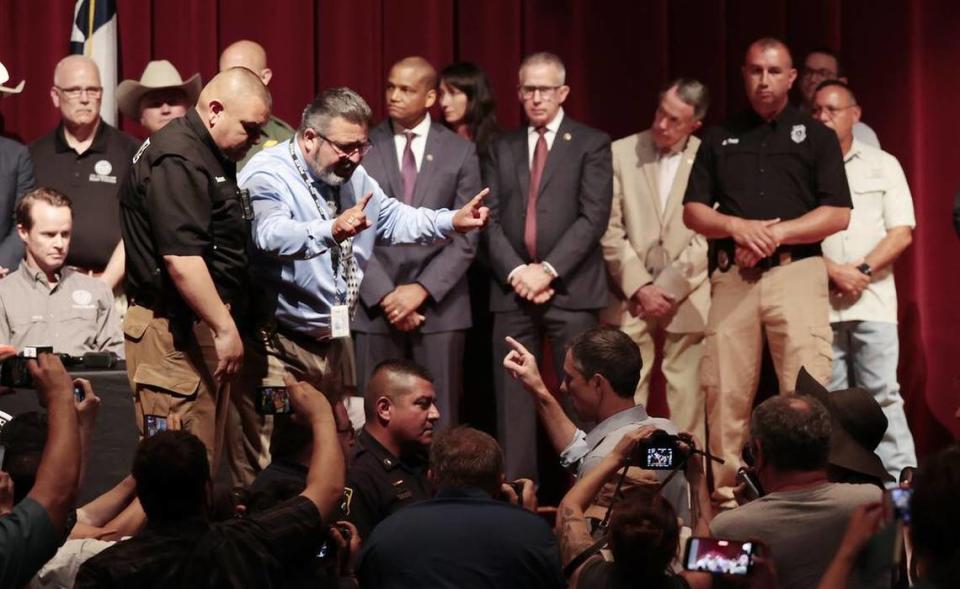The Uvalde, Texas, shooting finds us tired of saying it’s the guns. It’s still the guns
It’s frustrating, exhausting and defeating to tell the same truth again and again to no avail. That doesn’t make it untrue.
We don’t have to survey the broad scope of modern American violence to determine that we have a gun problem. We don’t need a decade of statistics or two years of pandemic-driven dislocation. We only have to consider the past cruel month — or just one of its abominable days.
Tuesday’s slaughter of 19 elementary school students and two teachers in the small South Texas town of Uvalde unfolded just over a week after the attack on a supermarket in Buffalo, New York. It missed the nation’s record for children killed in a single shooting, set a decade ago in Newtown, Connecticut, by one. It fell short of the most lives lost to an American mass shooting by many; it wasn’t even one of the three deadliest in Texas.
Opinion
Both Uvalde and Buffalo were the work of killers who, at 18, were nearly children themselves. On the day of the Texas shooting, Sacramento school officials discovered a gun and a loaded magazine brought to school by a second-grader. And, as The Bee reported, it wasn’t even the first time a firearm was found at an area school this month.
The day after the racist attack by a white teenager in a predominantly Black neighborhood of Buffalo, a Chinese American senior citizen apparently motivated by nationalist hostility opened fire on a Taiwanese American church in Southern California. This was just one month after Sacramento’s deadliest mass shooting, involving at least five gunmen allegedly driven by gang rivalries.
The motives of mass shooters, when they’re not inscrutable, have encompassed hatred, alienation, illness and more. Take in the whole bloody tapestry of the violence, and the reasons are that much more varied and defiant of description.
Our very focus on mass shootings — and, moreover, the deadliest subset thereof — is itself evidence of the overwhelming extent of American gun violence, which these extreme examples vastly understate. The number of gun killings in 2020 was nearly 40 times greater than the toll of mass shootings even by the broadest definition of the latter. When accidents and suicides are included, the gun toll is about 90 times worse than that of mass shootings alone. About one of every 10 of that year’s dead were children, making guns the leading cause of childhood death for the first time in decades.
Yes, it’s been a terrible few years in an America disrupted and decimated by the pandemic. Sure, we’re divided along racial, political and other lines. And of course we have our share, and probably more, of the sick and desperate, untreated and unaided.
All of this deserves dealing with, but it’s not why we have 19 more dead children. We have 19 more dead children because of a radical and relatively recent misinterpretation of the Constitution that keeps this country awash in so many deadly weapons that when the Sacramento police offered gas cards for guns, they ran out of gas cards. At both the state and national level, the correlation between the presence and accessibility of these weapons and the number of violent deaths is blindingly obvious.
Like countless preceding atrocities, this one won’t change the Supreme Court, which invented an individual right to bear arms in 2008, or the Senate, where members representing a minority of the population are blocking measures backed by huge majorities. Nothing will change the Senate or the Supreme Court quickly or easily. But they can and must be changed. In Uvalde, Buffalo and Sacramento, the awful alternative is all too clear.
Any politician choosing this moment to talk about other problems is trying to distract us from the problem at hand. Hence Texas Gov. Greg Abbott, an avid promoter of free access to firearms, deployed to the scene of the slaughter to discuss, of all things, mental health. The Republican governor’s rival for the office, Democrat Beto O’Rourke, was described as interrupting the press conference and accused of opportunistic politicking. But it was the governor who was orchestrating a politically motivated interruption.
“Why are we letting this happen in this country?” O’Rourke demanded outside the school after being removed. “We could have stopped this.”

This isn’t political; it’s human. It’s people actually grappling with what’s in front of them and marveling that their completely normal response is not remotely reflected in our collective political response.
O’Rourke channeled the same outrage as Arizona Rep. Ruben Gallego, who unleashed a profanity-laced tirade at another mass armament advocate, Texas Sen. Ted Cruz; California Sen. Dianne Feinstein, who went from championing an assault weapons ban to imploring her colleagues to restrict the weapons to those old enough to drink; and Warriors coach Steve Kerr, who dispensed with basketball questions in favor of a table-pounding cri de coeur: “When are we going to do something?”
“I’m tired,” he added. “I’m so tired of getting up here and offering condolences.”
Most of us are tired. I’m certainly tired of writing about this, having last done so days ago.
That’s the point: to make us tired enough to give up and accept the endless, insistent invitation to write, talk and legislate about anything else. But fatigue is no answer to murdered children.

 Yahoo Movies
Yahoo Movies 
